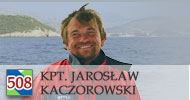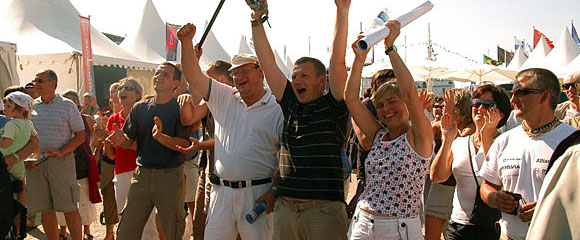
|
 |
|
||||||||||||||
 |
||
Capt. Kaczorowski's impressions of the first leg of the race
After the organizers announced the delay of the first regatta's leg of Transat, we found out that will start on Wednesday or possibly even on Tuesday. The cyclone, which was supposed to reach us in the Gulf of Biscay, turned out to be not as active as the meteorologists expected it to be and people began to speculate on Monday that we would set off earlier. At 6 p.m., as usual, we were supposed to have a meeting with the organizers and the meteorologists, but already around midday we knew we would start on Tuesday. I called Krzysiek Dumara, who prepared the weather charts for me in Poland, we arranged everything on the boat with Goły and Świstak, at 6 p.m. I listened to the official good news, and at 10 p.m. together with Kris, Andras and David Križek we had a teleconference with Jure, the meteorologist of the Solvenian team. The plan was to sail South around the Gulf of Biscay in order to avoid the weak wind by the orthodromic line. After passing the Cape Finnistere we would sail along the coast and then veer southwest towards Madeira. At midnight I went to sleep, at 5.45 a.m. I was already on the boat and at 7.30 a.m. I was passing the sluice. As expected the start was nervous. I heard many stories from previous Transat regattas where somebody crashed against somebody else's stern and tore off his rudder. I therefore chose for my boat's location the lee of the biggest group. 2 minutes before the start a French sailor approached me from the lee and started steering as if it were a short race around the buoys and not a 1100-miles long regatta. As a result we messed up at the start, but already on the opening buoy we improved. Very soon I raised my new fractional spinnaker and sailed real fast. After a few hours the wind abated somewhat, so I raised my "beast", the biggest, 86 square metre big spinnaker and sticked to the plan, which was to sail South below the rhumb line. I didn't sleep all night, because there were many ships and fishing boats, and the spinnakers had to be changed from time to time due to changing wind. The Eastern wind came a few hours later than expected and instead of my being north to the Cape of Ortega, I got stuck in a bay on its Eastern side. I managed to reach Cape Finnistere the third night, where I lead a wild rally between some 30 fishing cutters. A year ago I would treat it as an extreme situation. This time I have ascertained that I behaved as if it were some kind of a game. A game where colours are involved: green, red and white. Green is trouble, red is tackling a problem, and white means relief. None o my two warning systems worked and I was exhausted not having slept while sailing around the maritime region of Biscay. In the morning I fell asleep behind the rudder and I was afraid I would do something hazardous. I turned on the autopilot and went to sleep, hoping that during the day the fishing cutters would bypass me (which is not always the case). I stood up 2 hours later and to my delightment the wind was blowing from NNW and increased its speed to 22-25kn. I started to sail South very fast along the Spanish and Portuguese coast. I covered 100NM in 12 hours. I was predominantly surfing in a slide. When sailing 14kn. the boat was under control, above 16kn. it was all jokes aside. Nevertheless, no part of the boat got torn off. In the afternoon I heard on the VHF radio that one of the sailing boats is sending "PAN PAN RELAY" to the RCC. The message came from my Dutch friend Koen van Esch. This meant that the Flying Dutchman (which is the name of his boat) is in trouble. After 2 hours I managed to talk to Koen. It turned out that his boat hit something on the way and he had to sail towards the Spanish Bayona to mend his broken rudder. He asked the RCC for help to assist him while sailing, in order to avoid crashing against some ship. His steering capacity was limited and he was at the same latitude as me - which connects the Cape Roca and Cape Finnistere, a popular route for big ships sailing from Northern Europe to the Mediterranean Sea and the other way round. At first I thought that he had bad luck, but I wouldn't expect that the same thing would happen to me in a few hours. I was sailing South during the night in a slide. But I had to turn 3 miles to the West to deviate the ships' course, which were sailing on the North-South route. The ones sailing from the North were to the right, the ones coming from the South were to my left. I didn't dare to got to sleep though. Although I didn't sleep for the next 20 hours, I somehow "survived", owing possibly to the fact that sailing in a slide on a 6,5-metres long boat during the night is an extremely dangerous activity and releases adrenaline into the blood stream. However, only in the morning my body lacked the hormone and I started to sleep behind the rudder again. I decided to turn on the autopilot and wait until the sunrise. During the day the ships have the chance to espy me and bypass the boat on time. I thought it was a good solution. At about 7.00 a.m. something strongly hit my rudder fin and I woke up immediately. I lit up my lamp, but I was sailing too fast to notice what was the reason of the bang. I thought the rudder got torn off, but I was in the wrong. I quickly checked the deck and listened to the displacement chamber on the left ship's side whether it is not filled with water. Luckily, nothing happened. I was at ease. I had enough stress during the previous two days. I lay down in my sleeping basket, put my jacket under my head, turned the alarm clock to wake me up in 2-hours' time and I was cut off from power supply. After I had woken up (my alarm clock rings insistently until it is not turned off manually), I heard some strange noise - the autopilot ram was producing a loud sound, as if it was under high pressure. I looked at the rudders once again in the daylight and I freezed. The lower hinge of the left rudder was deformed and partly torn off from the rudder boxes. I turned off the autopilot ram, which was working as if somebody put a handful of loose tabs in the mechanism, I grabbed the extension rod and lost it immediately afterwards. The boat broached its course. I knew I had a big problem. I lost power and began calculating: I have 100NM to Cascais and over 500NM to Madeira. I thought of sailing to Lisbon, getting on a plane to Poland and forgetting about everything. I was surprised that the worse idea was the first that came into my mind. I remember thinking about a conversation I had with a psychologist in Poland before the start. I told him that during a storm I feel excellent, I think clearly, I feel positively angry, I act quickly and precisely. When in turn the circumstances improve, I feel down and hope for the worse. The psychologist explained that this is a natural reaction of the human's body after an adrenaline boost. One has to wait until it's over. I took my camera, I told what happened, I presented the possible solutions and it helped! After filming myself for 30 minutes, I suddenly realised that the race cannot end this way. I fastened myself well to the boat, went on the stern and with a kick fixed the ferrule. According to the route that Jure sketched I should be sailing South a couple of hours, but I turned South West earlier than planned as I could not develop maximum speed and take advantage of stronger wind. I forgot about the "Lisbon" plan and set the waypoint for Madeira. During the next days I was fighting behind the rudder. I tried to raise the big spinnaker, but couldn't hold the tiller. It was hard to sail on the fractional spinnaker. I lost my steering capacity several times during the day. My boat was sharpening its course in the direction of the wind and was bending towards the water. This happened to me some 30 times. Every time I prayed for my spinnaker not to be snatched or for my boom and mast not to get broken. Luckily my boat bravely went these circumstances through, so I was sure it would take me to Brazil. At this point I would like to thank Goły. If it weren't for his nimble hands and diligence, we wouldn't be able to prepare our boat that well, bearing in mind how late the new mast and sails were delivered. Apart from the crash there were no accidents. Before the second leg we have to fully mend the rudder's ferrules and fill the plating on the rudder skeg. The crash has caused a blister due to delaminating and we had to remove it. We are now waiting for a delivery from France . Świstak sent carbon and glazed fabric, epoxy materials, paint, a new MERVILL ( an anti-radar detector) and a tiller extension. Jurek Jankowski from Eljacht sent me two additional auto-pilot electric rams. The one I had got seized up the next day after the crush. The spare one was used on a distance of 400NM under big load, so I cannot rely on it any more. Together with Jurek "Faruś" we decided that it will be safe to take 3 spare auto pilot electric rams for the race to Brasil (3100NM). Special thanks go to Jurek and his son Tomek, who helped me and Goły from the beginning to solve electricity- and electronics-related problems. It occurred to me sometimes that I called Jurek during the night and asked him for advice and usually it helped to tackle a problem. We set off on 6 th October if the weather allows us. Greets from Madeira, |
||
The other news |
||
|


